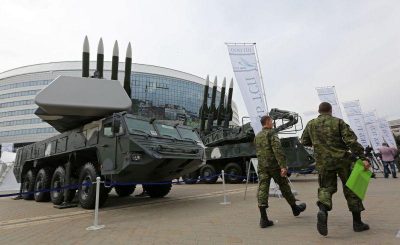US Is About to Sanction the World if They Don’t Stop Purchasing Russian Weapons
"European Recapitalisation Incentive Programme" will see the US sanctioning countries that purchase Russian and Chinese arms unless they transition to American ones

The CAATSA (Countering America’s Adversaries Through Sanctions Act) sanctions concept of economically punishing countries that continue to purchase Russian and Chinese arms is about to become much more effective after the forthcoming global application of the “European Recapitalisation Incentive Programme”, which will see the US sanctioning states that don’t progressively transition away from their current multipolar suppliers to American ones instead.
Adding a carrot of sorts to the traditional sanctions stick, the US will help countries fund their new American purchases, which will supposedly incentivize them into complying with Washington’s demands. This new policy represents a much more muscular approach to “military diplomacy” than before and shows that the US properly understands the challenge that Russia and China’s own application of the same poses to its global interests.
To explain, military relationships aren’t the same as most trading ones where the customer simply purchases a product and that’s usually the end of the exchange. Rather, they usually imply long-term partnerships where the seller agrees to maintain the military wares for an agreed-upon length of time and train the end user in how to properly operate them, which lays the basis for more comprehensive and strategic relations between the two parties as a result of these trustful ties.
There are also billions of dollars to be made these deals too, to say nothing of any others that result from this exercise of “military diplomacy”. In addition, countries that have established these close “deep state” relations with Russia and China are generally more aligned with those two multipolar Great Powers and not as easily manipulated by the US, which is of course concerning from an American standpoint.
In response to the quiet expansion of Russian and Chinese influence all across the world through “military diplomacy” and the effect that it’s even begun to have on notional American allies such as Turkey, the US has decided to strike back in order to reverse the tide and regain its lost strategic ground.
Seeing as how America’s robust market is the world’s envy and the dollar is still by far the world’s main reserve currency, the Trump Administration realized that it could leverage these economic advantages to its favor by weaponizing them in pursuit of these military-strategic aims.
Countries and their “deep states” that are more closely connected to the US economy are therefore the most vulnerable to this sanctions blackmail and thus much more likely to comply with the US’ demands for self-interested reasons in order to avoid the national and personal difficulties of trying to survive under a gradually worsening sanctions regime.
While Turkey and India are obviously the two most well-known targets of this tactic, it’s important not to lose sight of the effect that this policy could have in the “Global South” states that lay at the center of the New Cold War competition. These countries are currently in the middle of the American-Chinese struggle for global influence and are being forced to choose between these two Great Powers, and while Russia could play a crucial “balancing” role in all of this (especially if it leads a new non-aligned movement [Neo-NAM]), Moscow is more of a supportive actor than the main player. Nevertheless, arms sales significantly contribute to the state budget and Russia could lose out on much-needed revenue in the coming years if the US’ policy succeeds in pushing Moscow out of those lucrative markets, which is why America’s new approach must be taken seriously.
It’s very possible that Russia and China will feel compelled to offer their own incentives for maintaining these military partnerships, such as technology transfers, deferred payment plans, and reduced prices, which might ultimately work out to the customers’ benefit but could see the profit margin for this industry decrease as a result.
While this won’t be much of a factor for the US and China, it could once again pose an issue for Russia if its budget was planned with certain profit expectations in mind, so it’ll either have to increase its sales abroad to adapt to this new trend or generate replacement revenue elsewhere, both of which are likely being contemplated at the moment and would probably enter into practice soon enough once the “European Recapitalisation Incentive Programme” goes global and gives Moscow a run for its money.
*
Note to readers: please click the share buttons below. Forward this article to your email lists. Crosspost on your blog site, internet forums. etc.
This article was originally published on InfoRos.
Andrew Korybko is an American Moscow-based political analyst specializing in the relationship between the US strategy in Afro-Eurasia, China’s One Belt One Road global vision of New Silk Road connectivity, and Hybrid Warfare. He is a frequent contributor to Global Research.
Featured image is from InfoRos

